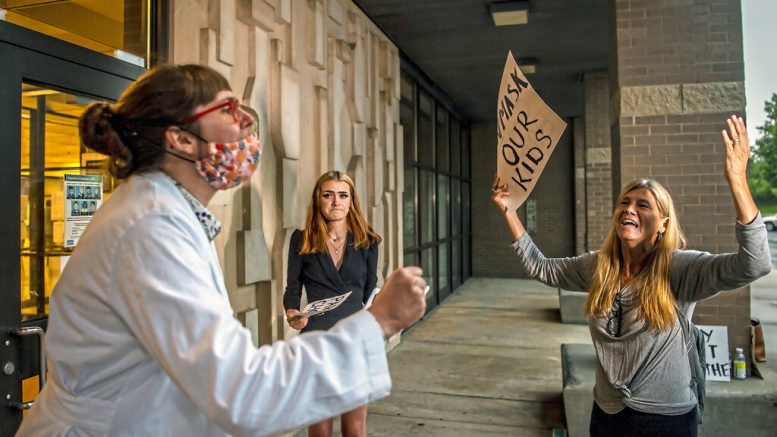HARRISBURG (AP) — A statewide mask mandate for Pennsylvania schoolchildren was thrown out by the state Supreme Court on Friday, raising the prospect that at least some students in the state may soon be allowed to attend classes without a face covering.
The justices announced their decision to invalidate the Wolf administration’s statewide mandate for masks inside K-12 school buildings and child care facilities but did not issue a written opinion that explains their reasoning.
They upheld a lower-court decision that the mandate was imposed by Democratic Gov. Tom Wolf’s acting health secretary without legal authorization. The practical impact of the decision will depend on what the justices say in the written opinion or opinions they will issue in the case and which schools and school districts impose their own masking requirements.
The court took action amid a statewide surge in new infections and hospitalizations. Pennsylvania is reporting an average of 7,571 infections per day, up over 20% in two weeks. Hospitalizations have risen 55% since mid-November, to an average of more than 4,000 per day, and acute-care facilities are becoming overwhelmed.
Wolf press secretary Beth Rementer described the decision as “extremely disappointing.”
“The administration recognizes that many school districts want to ensure a safe and healthy learning environment for students and staff, and we are hopeful they will make appropriate mitigation decisions moving forward,” Rementer said.
She urged districts to prioritize health and safety, calling masks “a proven and simple way to keep kids in school without interruption and participate in sports and other extracurricular activities.”
The justices upheld a Commonwealth Court ruling that Alison Beam, the acting state health secretary, lacked authority to require masks, did not follow state laws about enacting regulations and acted without a required existing disaster emergency declared by the governor in place.
The lower court found Pennsylvania’s disease control law does not give health secretaries “the blanket authority to create new rules and regulations out of whole cloth, provided they are related in some way to the control of disease or can otherwise be characterized as disease control measures.”
“The decision will be left to the 500 school districts in Pennsylvania, with respect to what to do with the implications of this order,” said Thomas W. King III, a lawyer for the Republican lawmakers, school districts, schools and parents who sued to challenge it.
King, who has advised against mask mandates, said school boards will have to consult their own lawyers about what policy to now adopt. As of the end of July, 59 of 474 school districts submitted plans to the state Education Department that mandated masks for the current school year.
“This is a great day in Pennsylvania for the rule of law,” King said. “The Supreme Court has proved that no one is above the law, and that includes the secretary of health or the governor.”
The decision comes just two days after the high court heard oral arguments in the case.
The lawsuit was filed by Senate President Pro Tempore Jake Corman, R-Centre; state Rep. Jesse Topper, R-Bedford; two religious schools; three public school districts; and several parents of schoolchildren.
Beam’s actions, the litigants argued, left the public unable to voice their opinions and the General Assembly unable to review the policy’s legality or necessity, and violated state law.
The attorney general’s office, representing Beam, told the court earlier this week there does not appear to be anything to prevent schools and school districts from issuing their own masking orders.
The mask mandate took effect in early September. Wolf announced in November he intends to return authority over masking decisions to local school districts in January, but will continue to require masks in child care centers and early learning programs.




































